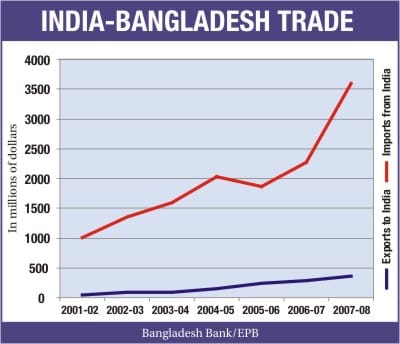Twin deals open broad scope for Dhaka

Bangladesh and India signed two deals relating to trade and investment last Monday. One, bilateral investment promotion and protection agreement (Bipa), is fresh and the other is a renewal of the 1980 trade pact.
The Opposition contradicts the move on the plea that it would harm Bangladesh's interests. The ruling party thinks the deals would enhance Dhaka-Delhi trade reducing a huge gap in it that tilts heavily towards India.
What these deals contain?
Bipa is a bilateral treaty, which is defined as an agreement between two countries for the reciprocal encouragement, promotion and protection of investments in each other's territories. The main purpose of this sort of pact is to create an atmosphere conducive to fostering greater investments by the investors of a country in another country.
Bipa's salient features include national treatment for foreign investment, an MFN (most favoured nation) status, free repatriation (transfer of returns on investment), recourse to disputes resolution and nationalisation / expropriation only in public interests on a non-discriminatory basis.
“Such agreements are beneficial for both the countries because they stimulate their business initiatives,” said Dr Atiur Rahman, a renowned economist.
He said: “Bipa is just a normal framework agreement. Many countries, including the US, have signed such agreement.”
India has so far signed Bipa with about 65 countries, out of which more than 50 have already come into effect. The remaining agreements are in the process of enforcement. Some others are in the pipeline for inking.
Generally, these bilateral agreements provide a legal basis for protecting investors' rights in the countries concerned. In other words, through such pacts the investors are assured that their invested money will be guaranteed fairly.
Meanwhile, following the renewal of the trade agreement, inked actually during President Ziaur Rahman's regime in 1980, a mixed reaction has evoked. A section of people says it would apparently pave the way for signing a Indo-Bangla transit deal.
In fact, any renewal of the agreement is a routine work, as the 13th clause of the deal obliges the parties to renew it once in every three years.
It was last renewed in March 2006, during the tenure of Begum Khaleda Zia.
The 1980 trade pact has also a clause that deals with water, rail and road transit. However, the two countries use merely the water route on a limited scale.
“If the two countries agree to implement the scope of the deal, they can, but it needs wider discussion,” said Atiur Rahman, who teaches Development Studies at the University of Dhaka.
Rahman also suggests Bangladesh study and assess the pros and cons of any possible execution of road and railway transit deal.
International trade analysts in a seminar last week also viewed that transit is a basic instrument in trade and South Asia has the potential to benefit from it, but most countries in the region lack a “true political will”.
Let's see the amount of Indo-Bangla trade last fiscal.
India exported over $3.6 billion worth of goods to Bangladesh in FY 2007-08, which was just $1 billion in 2001-02.
On the contrary, Bangladesh's export stood at $350 million in 2007-08 from $50 million in 2001-02.
“I am aware of the trade imbalance. Every time we discuss, we try to explore possibilities as to how the gap can be reduced. Surely what is possible is to reduce the gap and keep it within a manageable limit,” Pranab Mukherjee, the Indian foreign minister told reporters during his press meet after signing the deals.
India's bid to reduce the widening trade gap with Bangladesh is said to be reflected in some initiatives taken by Delhi, which include yearly zero tariff facility for Bangladesh's 8million pieces of readymade garments and the withdrawal of its embargo on Bangladesh's entrepreneurs' investment in the neighbouring country.
Although India has provided duty-free access to several items and is pruning the sensitive list for promoting exports from Bangladesh to India, it is not benefiting the country because, analysts say, Bangladesh has a very few products to export to India, Asia's third largest economy after Japan and China.
[email protected]

 For all latest news, follow The Daily Star's Google News channel.
For all latest news, follow The Daily Star's Google News channel. 



Comments